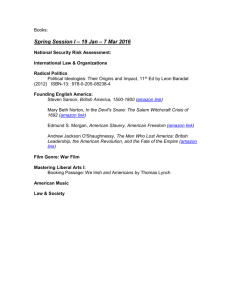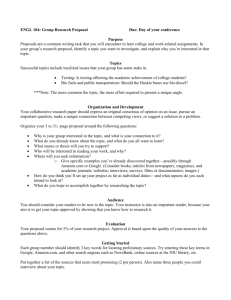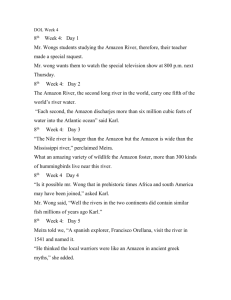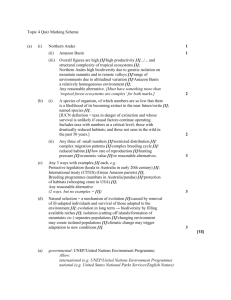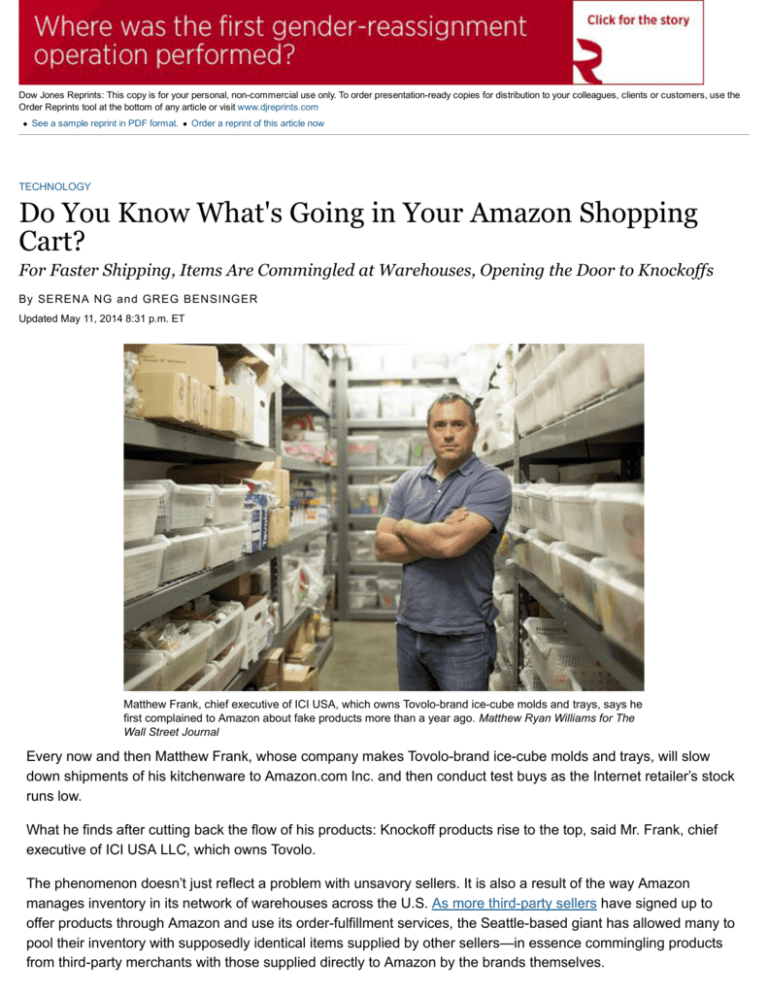
Dow Jones Reprints: This copy is for your personal, non-commercial use only. To order presentation-ready copies for distribution to your colleagues, clients or customers, use the
Order Reprints tool at the bottom of any article or visit www.djreprints.com
See a sample reprint in PDF format.
Order a reprint of this article now
TECHNOLOGY
Do You Know What's Going in Your Amazon Shopping
Cart?
For Faster Shipping, Items Are Commingled at Warehouses, Opening the Door to Knockoffs
By SERENA NG and GREG BENSINGER
Updated May 11, 2014 8:31 p.m. ET
Matthew Frank, chief executive of ICI USA, which owns Tovolo-brand ice-cube molds and trays, says he
first complained to Amazon about fake products more than a year ago. Matthew Ryan Williams for The
Wall Street Journal
Every now and then Matthew Frank, whose company makes Tovolo-brand ice-cube molds and trays, will slow
down shipments of his kitchenware to Amazon.com Inc. and then conduct test buys as the Internet retailer's stock
runs low.
What he finds after cutting back the flow of his products: Knockoff products rise to the top, said Mr. Frank, chief
executive of ICI USA LLC, which owns Tovolo.
The phenomenon doesn't just reflect a problem with unsavory sellers. It is also a result of the way Amazon
manages inventory in its network of warehouses across the U.S. As more third-party sellers have signed up to
offer products through Amazon and use its order-fulfillment services, the Seattle-based giant has allowed many to
pool their inventory with supposedly identical items supplied by other sellers—in essence commingling products
from third-party merchants with those supplied directly to Amazon by the brands themselves.
In other words, a product ordered from a third-party seller may not have originated from that particular seller. If the
bar code matches, any one that is on the shelf will do.
The system has enabled Amazon to make better use of its warehouse space and keep a wide variety of items in
stock around the country. The idea is to give Amazon flexibility to ship certain products based on their proximity to
customers, speeding delivery times. For third-party sellers, it saves them the trouble of having to label individual
items sent to the Amazon warehouse. The bar code takes care of that. But the practice has in some cases led to
mix-ups between counterfeit and authentic products, even when they are sent by Amazon itself.
The commingling program, whose participation is voluntary for third-party sellers, is one of a number of Amazon
policies that have hurt the giant retailer's relationship with makers of branded goods.
"It's very frustrating to see this happen," Mr. Frank said.
Amazon declined to comment.
An Amazon instructional video on its official YouTube channel explains how the inventory commingling works.
Items entering Amazon's warehouses, whether from suppliers or third-party seller who have opted into the
program, are sorted by bar code. When shoppers buy those products from Amazon or a third-party seller that uses
the company's fulfillment service, Amazon will ship them from the combined inventory, typically taking products
from the warehouse nearest the customer.
WSJD is the Journal's home for tech news,
analysis and product reviews.
FCC Chairman to Revise Proposed
Broadband Rules
What's in Your Amazon Shopping Cart?
Parrot Bebop Drone Has Big Camera, GPS
for Aerial Action
Should Companies Monitor Employees'
Social Media?
FAA, Drones Collide Over Rules
Sometimes, fakes can get mixed in. Justin Dunham, a mathematics
professor in Kansas City, Mo., said his wife bought him what was
supposed to be a Tovolo King Cube Ice Tray from Amazon. A receipt
for the $8.50 purchase shows it was sold by Amazon, not a
third-party seller.
The tray was flimsy, water spilled easily and it broke after a few uses,
Mr. Dunham said. He later picked up an authentic Tovolo ice tray at a
kitchenware store and saw the difference. "The ice cubes slide out
much more easily, and it's more stable when full of water," said Mr.
Dunham, who didn't ask Amazon for a refund. "I definitely wish I'd
gotten the correct tray the first time."
A few other Amazon customers also complained in reviews that the
trays they received were imitations. It wasn't clear which seller supplied the trays to the warehouse.
ICI USA's Mr. Frank said he first complained to Amazon about the fake ice trays over a year ago and asked that
Amazon store Tovolo merchandise only with items from authorized distributors. He said he hasn't received an
answer to that request, but said he was told that third-party sellers now have to paste a label on their products that
would allow individual items to be traced to individual sellers if customers complain.
Amazon declined to comment.
Amazon's inventory commingling "has been causing a lot of angst" for makers of branded goods that are trying to
curb unauthorized sellers of their products on the site, said Wes Shepherd, chief executive of Channel IQ, which
monitors online prices and sellers for brand owners and other clients. Commingling inventory makes it harder for
manufacturers to identify leaks in their distribution network.
"You don't really know whose product it is," he said.
German knife maker Wüsthof recently told its authorized distributors that come June 30, they can no longer store
its products in Amazon's warehouses, because the manufacturer doesn't want the merchandise commingled with
items from unauthorized third-party sellers, said Todd Myers, vice president of sales at Wüsthof-Trident of America
Inc.
Authorized Wüsthof distributors may still sell through Amazon, they just can't use its fulfillment service, meaning
they have to ship purchases themselves to customers. Wüsthof itself stopped selling its knives directly to Amazon
around two years ago, according to Mr. Myers.
Last year, Johnson & Johnson temporarily halted sales of many of its consumer products to Amazon, because it
felt the retailer wasn't doing enough to stop third-party sales of damaged or expired J&J personal-care products
and over-the counter drugs. The companies aren't saying how they ended the standoff. Some other well-known
companies, such as Estée Lauder Cos., don't distribute their products to Amazon, even though third-parties sell
them on the site.
Not all products in Amazon's warehouses are eligible for commingling. The policy doesn't apply to most media
products, like CDs and DVDs, groceries and "high value" items, according to the company's video. It isn't clear
why this is the case, but a few large media companies have sued third-party sellers on Amazon, alleging they
were selling illegitimate movies and other media products.
Several big brands that received complaints of fake products sold on Amazon have won some safeguards. In the
case of consumer electronics company Bose, for example, Amazon limits which third parties can sell their
products new and store them in its warehouses.
Carolyn Cinotti, Bose's public-relations director, said Amazon "has been very responsive" to its complaints about
unauthorized third parties that were selling knockoffs of its headphones and speakers.
For others, Amazon has been less responsive.
Kennedy International, which makes various branded home storage and laundry products, has complained to
Amazon "multiple times" about imitation Woolite-branded bra-wash bags sold on the site, said Ralph Nasar,
Kennedy's licensing and marketing director. A few authorized distributors of the items sell on Amazon, but some
sellers are offering counterfeit merchandise that is being commingled with the real products in Amazon's
warehouses, he said.
"It's been almost impossible to control and very upsetting to us," Mr. Nasar said.
Write to Serena Ng at serena.ng@wsj.com and Greg Bensinger at greg.bensinger@wsj.com
Copyright 2013 Dow Jones & Company, Inc. All Rights Reserved
This copy is for your personal, non-commercial use only. Distribution and use of this material are governed by our Subscriber Agreement and by copyright law. For non-personal use
or to order multiple copies, please contact Dow Jones Reprints at 1-800-843-0008 or visit
www.djreprints.com

